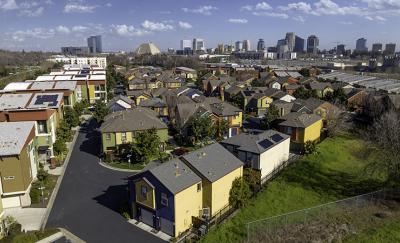
Environment & Energy
Protecting our environment, advancing energy innovation, and strengthening communities to ensure a resilient and secure future—at Abt Global, we partner with governments, businesses, and local communities to implement effective solutions that confront the challenges of today and tomorrow. By taking a practical, results-driven approach, we help our clients address extreme weather and environmental risks at the scale and speed necessary to protect natural resources and bolster economic opportunity.
Our Approach and Results
Abt researches, refines and resources solutions for sustainable energy, improved air and water quality, and more resilient food and health systems. In the U.S. and around the world, we develop practical policies to advance national interests, build efficient energy solutions like methane capture, and help U.S. Tribal Organizations win grants for environmental stewardship.
Lead USAID’s global flagship program to help partner countries build policy and institutional frameworks for greater investment in sustainability and resilience across sectors
Build countries’ capacity through the Global Methane Initiative to capture methane from waste and harness it as a source of local clean energy
Forge public-private partnerships to connect health facilities across sub-Saharan Africa with clean energy and digital connectivity
Featured In Environment & Energy

HETA: Powering Health with Clean Energy in Africa
Across sub-Saharan Africa, at least 100,000 health facilities lack access to reliable electricity and internet connections. This gap threatens health when clinics can’t keep the lights on for nighttime services or reliably provide patients with oxygen…

USAID Catalytic Action through Localized Policy Solutions (CATALYST)
USAID CATALYST is a global program that helps countries build policy and institutional frameworks that enable greater investment in sustainability and resilience across sectors.

Capturing Methane From Wastewater in Developing Countries
Municipal wastewater accounts for a substantial amount of methane emissions worldwide. Capturing and using methane from wastewater systems can help mitigate climate change and provide a source of local clean energy. However, cities in developing…

Best Practices to Improve International Solid Waste Management
Many medium and large cities in developing countries lack the capacity to adequately manage solid waste. Limited awareness of best practices for waste management and lack of access to key technical resources are key barriers to improvement.

TSPi Enhances the Efficiency of NOAA NMFS’s Consultation Process
TSPi designed, built, and implemented a central replacement case-management application, the Environmental Consultation Organizer (ECO), to handle submissions for consultations. The consultations can include the initial submission of project blueprints, feedback from NMFS, and more back-and-forth until final approval.

Spotlight On: Building Resilient Water and WASH Systems
Around the world, Abt Global partners with donors, federal agencies, and local organizations to build resilient water management and WASH systems.

How Can We Deliver Reliable Energy to Africa’s Health Sector?
Joan Chahenza shares how the Power Africa Health Electrification and Telecommunications Alliance (HETA) is working to enhance private sector participation in health facility electrification in sub-Saharan Africa.

Spotlight On: PFAS, Environmental Contamination, and Health
Abt has extensive experience investigating and addressing the complex effects of per- and polyfluoroalkyl substances (PFAS) in the environment and on human health.
Latest in Environment & Energy

Housing California Annual Conference 2025
Join Abt Global and other leaders for the Housing California 2025 annual conference in Sacramento.

2025 Innovations and Solutions for Ending Unsheltered Homelessness (NAEH)
Meet the Abt Global team at NAEH’s 2025 Innovations and Solutions for Ending Unsheltered Homelessness conference in Los Angeles.

USAID Catalytic Action through Localized Policy Solutions (CATALYST)
USAID CATALYST is a global program that helps countries build policy and institutional frameworks that enable greater investment in sustainability and resilience across sectors.

Our Experts: Environment & Energy
Explore Our Focus Areas in Environment & Energy

Circular Economy & Waste
Inadequate solid waste management threatens human health and the environment—and represents a missed economic opportunity to create jobs and recover the value of discarded materials. Abt Global works with clients to promote a circular economy—a systematic approach to reduce the health, environmental, social, and economic impacts of solid waste through the design of restorative and regenerative materials, products, systems, and business models. We align our clients' resource management strategies with key principles of sustainable consumption and production.

Clean Air, Water & Land
Clean air, water, and land are fundamental to sustaining ecosystems, supporting human health, fostering biodiversity, and ensuring economic prosperity. Abt Global is at the forefront of sustainable solutions, shaping quality standards, regulations, and policies that protect human health and the environment. We design cutting-edge tools and models that monitor greenhouse gas emissions and help quantify public health effects from air pollution. We are leaders in methane mitigation, developing solutions at the nexus of solid waste, methane, and health. We have extensive experience with evaluating water quality impacts and addressing contamination caused by chemical compounds like per- and polyfluoroalkyl substances (PFAS) at the federal, state, and community level. We are champions of a circular economy approach to solid waste management. Our multidisciplinary expertise in data analysis, regulatory support, toxicology, policy development, and environmental and human health informs tailored sustainable solutions for our clients that address immediate environmental challenges and foster a healthier and more prosperous future for communities worldwide.

Disaster Risk & Emergency Management
Abt Global’s experts provide sustainable and resilient disaster relief and emergency preparedness solutions to protect human health and wellbeing, as well as the environment. Our economists, scientists, engineers, and communicators partner with government agencies and communities to prevent, address, and reduce environmental emergencies such as toxic releases and waste from industries and municipalities. We lower barriers to disaster risk finance and boost investments in the resilience of various sectors, including energy and agriculture. We facilitate informed decision-making through early warning systems and risk assessment tools. From analyzing regulatory and policy options to characterizing historical contamination and evaluating resilience and response activities, we collaborate with clients and communities to meet their needs.

Energy, Infrastructure & Transportation
In addressing modern energy challenges, Abt Global focuses on practical solutions to strengthen energy independence, enhance infrastructure reliability, and improve transportation efficiency around the world. We work to reduce harmful emissions, modernize health facilities with reliable energy, and provide in-depth policy analyses. We partner with governments, utilities, investors, developers, and local communities to support infrastructure modernization, improve energy efficiency and security, and catalyze private sector investment in energy projects. Our initiatives are guided by a commitment to national prosperity and security, fostering a future built on responsible energy practices and innovation.

Environmental Research, Assessment & Restoration
Our natural resources possess an extraordinary ability to recover when properly managed. However, as challenges like oil spills and environmental degradation occur, it is vital to equip communities and leaders with practical tools to restore these resources effectively and responsibly.
Abt Global supports federal, state, and Tribal partners by providing expertise in Natural Resource Damage Assessments (NRDAs), restoration planning, and environmental science. With a track record of delivering scientific, legal, and strategic support for over 150 cases, we prioritize actionable solutions to protect and restore our nation’s natural resources.

Nature & Biodiversity
Nature and biodiversity provide essential benefits: maintaining clean air and water, supporting natural defenses for coastlines, and contributing to livelihoods. Abt Global collaborates with partners around the world to protect and restore vital habitats, natural resources, and species critical to communities. Our work includes restoring ecosystems affected by hazardous materials, repairing habitats impacted by improperly planned infrastructure, and protecting essential resources like mangroves and seagrass. We promote practical investments in marine industries and support locally driven conservation efforts that respect the knowledge and stewardship of communities. Our tailored approaches emphasize practical solutions to safeguard ecosystems while meeting local needs and priorities.

Value for our Clients
Our work for public, private and non-profit organizations reflect our shared values and steadfast commitment to quality standards, best price, and lasting impact.














Our Clients In Environment & Energy

Join Our Team
Interesting in a rewarding career with Abt? Visit our Careers Page to find out more about what it means to work with us. Already all-in? Search for a job now.
Featured Jobs in
Health Care Research Expert and Technical Project Director (Associate)

Abt Global seeks to expand its health care research team with the addition of a health care research expert with demonstrated success directing projects funded by the Centers for Medicare and Medicaid Services (CMS). As a member of the Research, Monitoring, and Evaluation Capability, you will join Abt’s team of experts to conduct policy-relevant health care research and evaluation focused on post-acute care and nursing home health care
Director, Bougainville Partnership | APSP

Papua New Guinea
A stable, prosperous, peaceful and resilient PNG is critical to Australia and New Zealand’s interests. Australia is PNG's largest development partner; its main partner on economic and security issues outlined in Australia’s Comprehensive Strategic Economic Partnership with PNG (CSEP) and Development Partnership Plan with PNG 2024-2029

More About Abt

Our Insights

Our Services

















